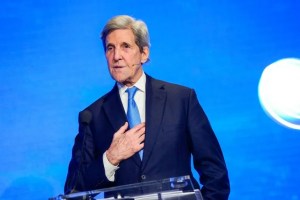Greta Thunberg has changed in recent months; no longer the naive and innocent girl saying that the emperor is naked, now a smiling-aggressive sharp-tongued demon. But her message remains the same, simple and repeated. One should recall here Kierkegaard’s wonderful short text ‘On the Difference between Genius and Apostle’, where he defines genius as the individual who is able to express / articulate ‘that which is in him more than himself’, his spiritual substance, in contrast to the apostle who ‘in himself’ does not matter at all: the apostle is a purely formal function of the one who dedicated his life to bearing witness to an impersonal truth that transcends him. He is a messenger who was chosen (by grace): he possesses no inner features that would qualify him for this role.
Lacan mentions a diplomat who serves as a representative of his country: his idiosyncrasies are irrelevant, whatever he does is read as a message from his country to the country in which he is posted – if, at a big diplomatic conference, he coughs, this is interpreted as softly signaling his state’s doubt about the measures debated at the conference, etc. And Greta is also not a creative genius but an apostle of a truth: she does not bring forward some ingenious new insights, she just repeats the same simple message again and again. Talking about politicians, she said: ‘We have not taken to the streets for them to take selfies with us, and tell us that they really, really admire what we do. We children are doing this to wake the adults up.’ This is how a true apostle talks, effacing herself from the picture again and again, fully aware that the focus on her, even if it is celebratory, works as a distraction from her message.
We often hear that, in order to confront appropriately the threat of an ecological catastrophe, we have to renounce ‘anthropocentrism’ and to conceive of ourselves (humanity) as a subordinated element in the great chain of Being: we are just one species on our planet, but through our ruthless exploitation of its resources, we (humanity) are posing a threat to our mother Earth, and that Earth is punishing us through global warming and other ecological threats. You cannot help but laugh at this vision: not Earth, we are in trouble. Earth is indifferent, it survived much worse disasters than the possible self-destruction of one of its species. What is under threat is OUR environment, OUR habitat, the only one in which we can live. From the imagined standpoint of Earth it would have been much better for its global ecosystem if we (humanity) disappear, so what is under threat in ‘ecological crisis’ is our survival, the survival of our society. And therein resides the hidden anthropocentrism of such anti-anthropocentric visions: in spite of all the babble about privileging Earth over our interests, what we are after is (an environment that would befit) our survival and well-being.
This is also why the true stakes of ecology are socio-political: ecology is not about caring for nature, it is about a social reorganization that would maximize the conditions of our well-being. Greta Thunberg is fully aware of this: when she refers to science (admonishing politicians to listen to science), she addresses politicians, not scientists: her aim is not to leave politics behind, it is not depoliticization, but to contribute to the rise of a new politics, a politics that would be effectively universal, addressing us all while (as befits all politics) still dividing us (i.e., fighting against those who deny the threat of an ecological catastrophe). Ecological struggle is politics at its most radical. Another version of universal politics is the one associated with the names Assange, Snowden and Manning, that of ‘spying for the people’, disclosing to the public problematic state secrets. With regard to one’s own sovereign state, such an activity is ‘treasonous’, which is why it is by definition universal, i.e., ‘betraying’ one’s fidelity to one’s own state.
When Greta calls us to listen to science and take it seriously, this does not mean that science also provides the political answers to what we are to do. Science enables us to discern the contours of the deadlock in which we are (the catastrophic ecological implications of our economic development, etc.), but there is no ‘scientific politics’ – when we hear this slogan, we are right to suspect the worst of manipulation and domination. The science we should listen to is not a neutral instrument of salvation but something we should overcome, learn to think beyond its horizon. Greta is not a totalitarian acting as an instrument of the scientific big Other, she is proposing scientific data as the base which should compel us elaborate a new emancipatory project and act upon it.



















